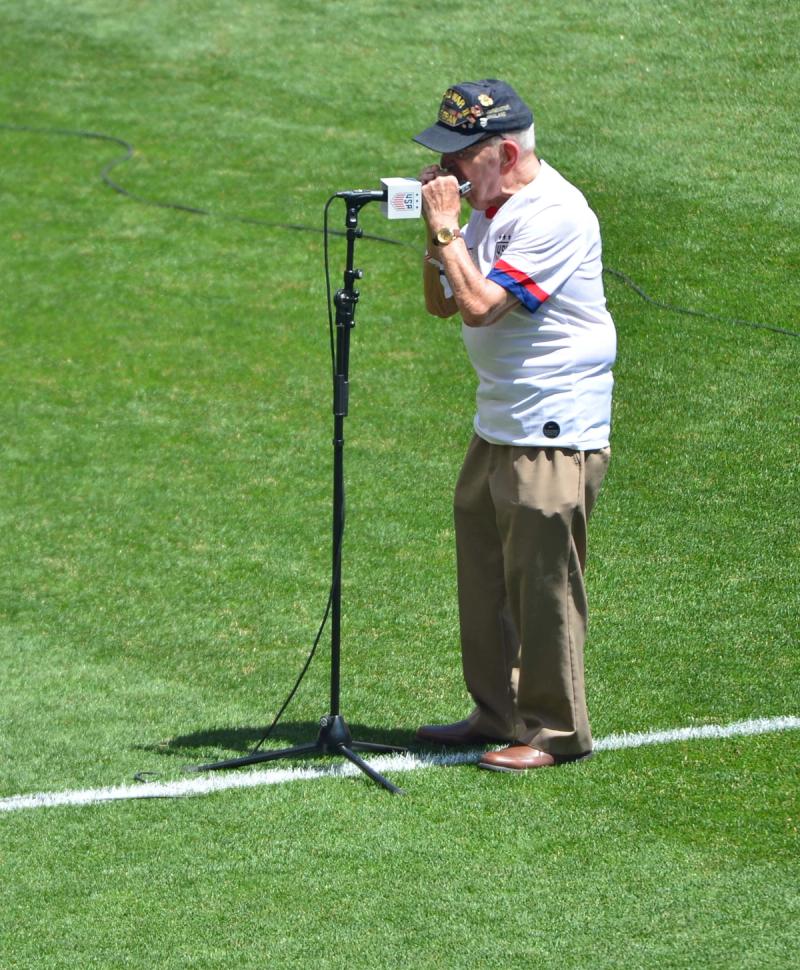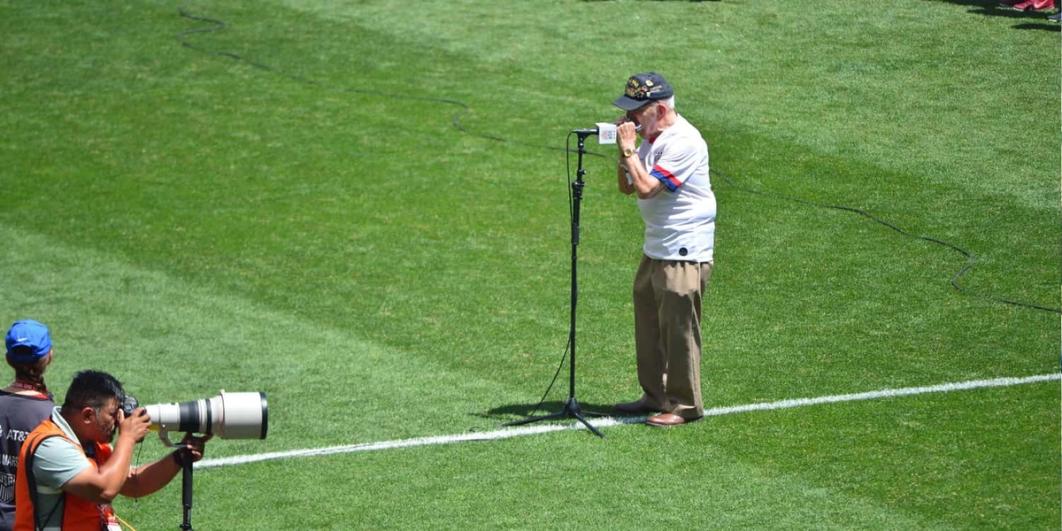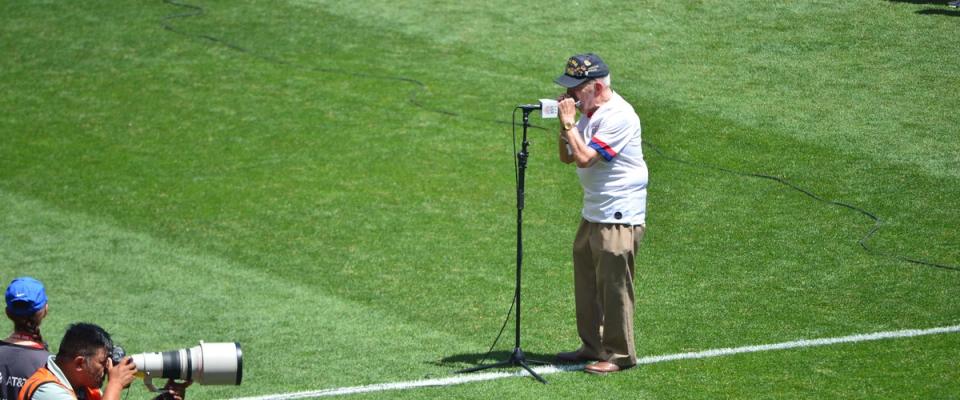As a 10-year-old growing up during the Great Depression, Pete DuPre's first harmonica was purchased by his father for 50 cents.
DuPre mastered the instrument, allowing him to showcase his talent at church services, funerals and sporting events, even at the age of 96.
Crowd size doesn't intimidate the man known as Harmonica Pete.
"I'm blessed with the ability of not being affected in any way," he said. "The size of the crowd is irrelevant and that's good because I don't get nervous. I feel very comfortable out there and that's a gift of God. Like my harmonica playing is a gift of God."
Prior to the U.S. Women's National Team's final Send-Off Series game against Mexico on Sunday, May 27, you might have heard DuPre's emotional and memorable rendition of the Star-Spangled Banner he played on his harmonica. If the crowd of 26,322 at Red Bull Arena wasn't already standing for the national anthem, he probably would have received a standing ovation. After he was finished, DuPre took off his hat and waved it to the fans and blew a kiss as well.
Organizers could not have found a more perfect individual to perform the national anthem a day before Memorial Day because he had a unique tie with the U.S. women. In January, he met several players on the Omaha Beach in Normandy, France, where the Allied Forces staged the D-Day invasion. He served as a medic during World War II.
"It was wonderful, wonderful," DuPre said about meeting several members of the team.
The WNT players got an opportunity to meet DuPre and several servicemen when the squad played France in an international friendly in Le Havre in January. They traveled to Normandy in the northern part of the country, one of the landing areas of the D-Day invasion. June 6 is the 75th anniversary of the historic event.
"I was really emotional," center back Julie Ertz said. "It was amazing to meet the four veterans. They were the sweetest things ever. Their stories put a lot of perspective into being there with them and hear their stories. We represent this country on a very different level than they did, and I'm just very honored to meet them and be there to hear the stories."
For defender Crystal Dunn, it was the trip and meeting of a lifetime.
"Oh, it was incredible," she said. "Visiting Normandy was an experience that I knew I didn't want to pass up. It was on our off day, and a lot of us were thinking, 'What should we do?' For us to get that opportunity to really see where that main event took place was eye-opening."
Dunn admitted she shed some tears.
"There were pictures on line of me crying and I was like, 'Take those down! Take those down!" she said. "I don't care though. They were telling me all the stories of what it was like to be there and some of the stories were so frightening that you would think be in a movie. I remember my emotions getting the best of me. To really hear that from somebody who was there, who said, 'I saw so many of my friends die right before my eyes.' Oh, my gosh. It was incredible."
DuPre, who lives in the Rochester, N.Y. suburb of Fairport, and his generation did not have it easy during his early years, growing up during the Great Depression when jobs and money were scarce.
He was introduced to the harmonica as more of a necessity than a love for it or music. After his family moved to a Pittsburgh suburb in 1933, DuPre attended a school that had a harmonica band.
"A harmonica band sounds kind of weird but during the depression and I am talking about the middle of the depression, schools could not afford tubas, trumpets, sax, drums, but they could afford harmonicas. To take care of a bunch of kids, they bought little Marine Band Harmonicas."
Since DuPre didn't know anyone in his new neighborhood, he figured that if he could join that band so he could make friends. He said his father "saved a penny here and a penny there," enough to buy a harmonica during some rough economic times.
DuPre discovered one room in the house which "was absolutely perfect to learn" his new-found instrument – the bathroom.
"We were not musical and there was no music in the family, but I had my harmonica and I wanted to learn to play," he said. "The room had tiled walls, tiled floor, a bathtub, sink, and the resonance there was perfect, absolutely perfect, like having your own sound chamber. I used to sit on that one chair in the middle of the room and learned how a particular note was. God gave me enough back here [pointing to the back of his head] to hold onto that sound.
"After a while it just kind of blended in. I'm not a musician. I never had a music lesson in my life."
As DuPre discovered, life can have its own lessons, some bitter ones. By the time he was 20-years-old he and his four siblings had lost both their mother and father, who passed away. He became the acting patriarch of the family, trying to hold it together.
"My mother died at 44 with five kids," he said. "My dad remarried because all of a sudden he had five kids. He was on the road. He was a tobacco man. We didn't have parental guidance at all. My dad died two years after my mother. So, we were suddenly five orphaned kids. I was the oldest boy and I was 20. Thank God for the neighbors and relatives that we had. Nobody got into any great trouble or anything."
There were, however, far greater forces at work. World War II broke out and DuPre found himself with the U.S. Army across the Atlantic Ocean. As it turned out, DuPre followed a family tradition by working on the medical side. In World War I, his mother was a nurse in the Royal Canadian Air Force and his father was a medic and foot solider.
"So, we had that medical background," he said. "When it came time to get [into the service], I tried to get into medics because I had such extensive training and practice. When you took care of these guys when they came back, you learned an awful lot of hands-on medicine."
DuPre was stationed in the 114th General Hospital Unit in Kidderminster, England.
"It was busy, it was tremendously busy," he said. "They knew they were going to have great numbers of wounded who were dying.
"So, we were highly trained medics. Our job, a guy gets injured in the battle of the bulge, for example, and he's lying there in the snow and bleeding. A medic comes along, stops the bleeding, sets the broken bones to the extent that you'd be able to move this man, and then they would fly him across the channel to us. Our job was to put them back together again. That usually leads to 'Wow, you must have seen some stuff' and we did."
He served three years there.

Fast forward to the 21st century.
DuPre has represented the USA through the Greatest Generation’s Foundation, an organization that was founded by Australian Timothy Davis and allows veterans to travel overseas to see the results of what they sacrificed for and to receive thank you’s from recent generations.
- Listen to Harmonica Pete's musical "Tribute to the Greatest Generation" on Apple Music.
The foundation allowed DuPre to journey to France a few times. One was on Armistice Day, the 100th anniversary of the end of World War I on Nov. 11, 1918. He and several surviving servicemen were flown to Paris to partake in the ceremony during pouring rain in Paris. That was extra special for DuPre, because both of his parents served during The Great War.
In January, DuPre and his colleagues met several U.S. players on Omaha Beach and that helped lead to him to playing his harmonica on Sunday.
DuPre admitted he wasn't a soccer fan, but he has been a fast learner. He was impressed with the American and Mexican women in the U.S.'s 3-0 victory on Sunday. DuPre noted during the second half, "Soccer is a tough game physically."
During that January visit, the U.S. team was given a flag that was used at the Normandy invasion in 1944, which has hung in its locker room.
Dunn and some of her teammates got an opportunity to see DuPre at Red Bull Arena on Sunday.
"I'm so happy you're here," said told him.
"I want to wish you guys the best of luck!" DuPre replied.
The U.S. team and the flag will return to France to participate in the 2019 Women's World Cup. The Americans kick off the competition against Thailand in Reims on June 11 and meet Chile in Paris on June 16 before returning to Le Havre and the Normandy area to face Sweden in the final Group F match on June 20.

